
LIBRI DI GIAN MARIO BRAVO
La ricerca ha estratto dal catalogo 26 titoli


In the first half of the nineteenth century - in the UK - the Chartist movement linked the labor and class’ unrest to the achievement of universal suffrage and political democracy. By contrast, in Italy, the electoral laws engineered by the government of the center-left (2015) through the legislatve measure called Italicum distorts the purpose of the democratic tradition of the left and tends to replace the national political structure with an autocratic, authoritarian and caesaristic system.

Concepts of politico-economic and social equality and inequality have always accompanied the history of mankind. But it is especially in the contemporary world, with a real return to the middle ages, a marked inequality prevails in developed societies. In these, status’ differences are accentuated and are linked to the conflict between the classes and the rejection of social solidarity: the situation is worsened through the prevailing doctrines of extreme liberalism of laissez faire laissez passer and neo-liberalism. Key words: Equality, inequality, solidarity, social unrest, liberalism of laissez faire laissez passer, neo-liberalism.

The discussion on the Presidential system has frequently drawn the attention of politicians and political experts who refer to existing models (Usa, South and Central America, V Republic in France, etc.). In Italy too there has been an amount of discussion, noble as well as trivial. Particularly, the Right Wing world (sometimes, even some people from the Left) advocated an authoritative and elitist Presidential system, as opposed to and in contrast with the shortcomings of representative democracy, the power of the masses and the traditional political party organisation. The national Right and Silvio Berlusconi were surely inspired by this Presidential system, once created by Peron’s Populism and now by the pseudo-liberal despotism of contemporary politicians, when - in spring 2013 - they suddenly advocated an Italian "presidentialism" [Presidential system], corrected by the ties of democracy and by the binding force of the law.
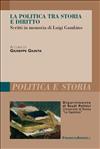
Studi in memoria di Luigi Gambino
Il volume nasce dall’iniziativa di un gruppo di studiosi che ha avuto l’occasione di lavorare, di confrontare le proprie idee, di condividere momenti di riflessione e di studio con Luigi Gambino, uno studioso che aveva fatto del rispetto dell’autonomia individuale un principio incrollabile della propria azione di vita.
cod. 303.46
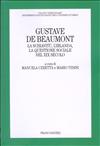
La schiavitù, l'Irlanda, la questione sociale nel XIX secolo
Il volume presenta la figura di Gustave de Beaumont (1802-1866), importante testimone della grande stagione del liberalismo ottocentesco. Nella vasta opera di Beaumont convergono numerosi temi oggetto di dibattito etico e civile nei decenni centrali dell’Ottocento: dai progetti di riforma penitenziaria, in una prospettiva di ampia riforma sociale, alla schiavitù, fino al problema della colonizzazione francese in Algeria e alla questione irlandese, vera e propria riflessione di “scienza politica nuova”.
cod. 886.56


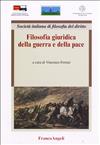
Gli interessi economici nella scelta tra guerra e pace, l’estremismo religioso ed etnico, gli argomenti prodotti dai poteri forti e dai media per giustificare o squalificare le azioni militari, il classico tema della “guerra giusta”: questi i temi affrontati nel volume, che raccoglie gli atti dell’ultimo congresso della Società italiana di filosofia del diritto.
cod. 2000.1214
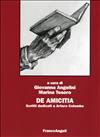
Scritti dedicati a Arturo Colombo
cod. 2000.1156
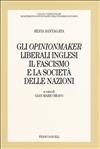
Il fascismo e la Società delle Nazioni
cod. 886.49

Departed twenty years ago, Alessandro Passerin d’Entrèves considered natural law as a sort of natural defence against any form of state’s extreme power and against its degenerations. In the theologian and ideologist Richard Hooker, d’Entreves, author of many works on the political philosophy which links up the Middle Ages and Modernity, saw an harbinger of the modern conception of the state and, for this very reason, a precursor of J. Locke. Hooker appears to him as the forerunner of the British constitutional model, built on individual freedom and independence, from which d’Entreves got inspiration for his civil commitment in the fascist Italy which suffered from the lack of freedom.

1902-1985. Politica, filosofia, accademia, cosmopolitismo e "piccola patria"
cod. 2000.1080

cod. 1133.16


Piano di un corso di qualificazione ricorrente e di cultura politica
cod. 886.35

Alexander e Wilhelm Von Humboldt.
cod. 886.28

cod. 885.84

cod. 1133.17

cod. 1133.12